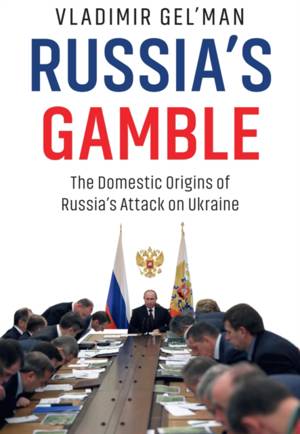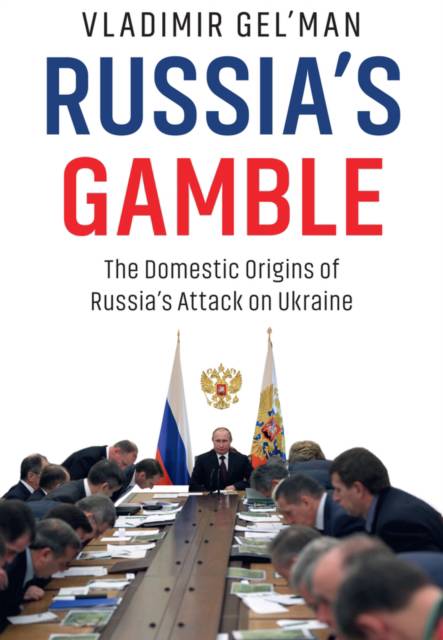
- Afhalen na 1 uur in een winkel met voorraad
- Gratis thuislevering in België vanaf € 30
- Ruim aanbod met 7 miljoen producten
- Afhalen na 1 uur in een winkel met voorraad
- Gratis thuislevering in België vanaf € 30
- Ruim aanbod met 7 miljoen producten
Zoeken
Russia's Gamble
The Domestic Origins of Russia's Attack on Ukraine
Vladimir Gel'man
Paperback | Engels
€ 30,95
+ 61 punten
Omschrijving
In February 2022, Russia launched a full-scale military assault on Ukraine, aimed at re-establishing Russian control over the Ukrainian state, economy and society, similar in many ways to the Soviet period. This goal, however, was not achieved, and most likely will not be achieved in the future. Rather, the Russian "special military operation" has resulted in extraordinary disasters and losses for Russia, for Ukraine, and for the entire world.
This book examines the origins of the Russian assault on Ukraine and offers an explanation of why it has not achieved its aims. Why did Russian elites and leaders propose, prepare for and implement the assault on Ukraine in such a poorly prepared and heavily destructive way? In seeking to answer these questions, Gel'man focuses on Russia's domestic agenda and its dynamics after the collapse of the Soviet Union. The personalist nature of the Russian authoritarian political regime, its vulnerability to bad governance, major misperceptions by the Russian elites and leadership, and reliance of the Kremlin upon previous experience of Russian impunity were all key factors that led to Russia's fateful decision to attack Ukraine and have continued to shape Russia's mistake-ridden conduct of the war since then. Gel'man also considers what lessons can be learned from Russia's military assault for understanding the global agenda and for the study of domestic and international politics in the twenty-first century.
This book, written by a leading expert on Russian politics, will be of great value to students and scholars in politics and to anyone interested in Russia and in the causes and consequences of the war against Ukraine.
This book examines the origins of the Russian assault on Ukraine and offers an explanation of why it has not achieved its aims. Why did Russian elites and leaders propose, prepare for and implement the assault on Ukraine in such a poorly prepared and heavily destructive way? In seeking to answer these questions, Gel'man focuses on Russia's domestic agenda and its dynamics after the collapse of the Soviet Union. The personalist nature of the Russian authoritarian political regime, its vulnerability to bad governance, major misperceptions by the Russian elites and leadership, and reliance of the Kremlin upon previous experience of Russian impunity were all key factors that led to Russia's fateful decision to attack Ukraine and have continued to shape Russia's mistake-ridden conduct of the war since then. Gel'man also considers what lessons can be learned from Russia's military assault for understanding the global agenda and for the study of domestic and international politics in the twenty-first century.
This book, written by a leading expert on Russian politics, will be of great value to students and scholars in politics and to anyone interested in Russia and in the causes and consequences of the war against Ukraine.
Specificaties
Betrokkenen
- Auteur(s):
- Uitgeverij:
Inhoud
- Aantal bladzijden:
- 220
- Taal:
- Engels
Eigenschappen
- Productcode (EAN):
- 9781509559435
- Verschijningsdatum:
- 25/06/2025
- Uitvoering:
- Paperback
- Formaat:
- Trade paperback (VS)
- Afmetingen:
- 150 mm x 230 mm
- Gewicht:
- 430 g

Alleen bij Standaard Boekhandel
+ 61 punten op je klantenkaart van Standaard Boekhandel
Beoordelingen
We publiceren alleen reviews die voldoen aan de voorwaarden voor reviews. Bekijk onze voorwaarden voor reviews.







